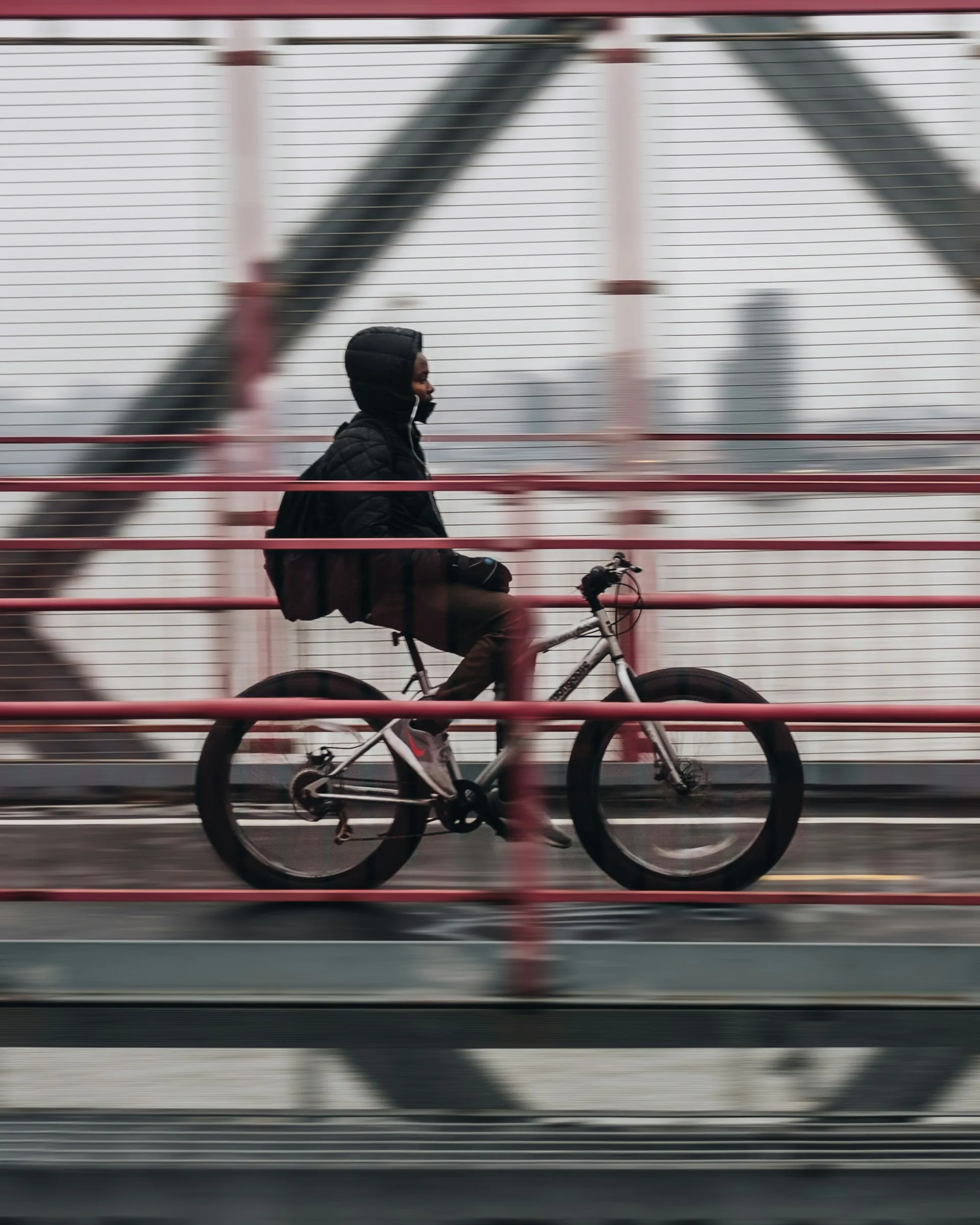One of the pleasures of biking is that you get to experience your surroundings much better than in a car. While driving, I’m ensconced within a box of glass and steel, going at speeds fast enough that I don’t have time for anything other than the driver’s-ed-approved cycle of focus on the road, glance at my mirror, glance at the speedometer, focus on the road. Biking lets me slow down and see everything around me. Behind the wheel of a car, going up or down a hill is nothing more than an often subconscious tap on the accelerator or brakes, but on a bike, I feel it: panting, thigh muscles burning, as I struggle to the top, or wind whipping in my face, exulting as gravity lets me briefly match the automobiles driving next to me.
At two miles, my office is almost the perfect distance for a bicycle commute. And, because I experience so much more of my surroundings on a bike, I’ve come to know those two miles well. From my neighborhood’s stop sign, leave at top gear and pick up speed going downhill. Use that momentum and downshift in time to make the brutal incline into the next neighborhood. Catch my breath and recover as I go over that neighborhood’s five speed bumps (installed to keep the neighborhood safe from nuisance cars cutting through, but too modest to hinder a slower, gentler bike). Go past the garage with the Christian nationalist flag, the house with what looks like a guest house out back (out of place in such a modest suburban neighborhood), the house with the never-ending remodeling project. Then it’s uphill again onto a busier street as traffic picks up and my energy flags. Onto the curb to avoid the pothole (finally filled in by the city government); across the creek bridge (almost unnoticeable, so extensive is the concrete and asphalt); steer to the left to avoid the poorly installed storm grate (bad enough to destroy my bike tire and send me flying); jostle across the furrows in the road (worn by semi trucks exiting the interstate on their way to Walmart). Onto a five-lane highway for the final stretch, but it’s a short distance with broad shoulders, so ignore traffic as I coast downhill into the office parking lot.
I experience more of my surroundings — but I’ve still only scratched the surface. I know almost nothing of the families who live, grow, play, prepare for work, and rest in the seventy or so houses that I pass. The remodeling project — why has it been going on for a year? The professing brother or sister who hung that Christian nationalist flag — what do we hold in common, and where do we differ, and how could we minister to each other? I see the rotating representatives of the city’s homeless community begging at the interstate exit, but I’m not part of their lives and don’t know how to help them. The estate sale sign on the last house to my right or the memorial flowers on the creek bridge each hint at an event that’s both universal and tragic, but all I know of them is the incongruous balloons that the survivors have attached to the sign.
Driving abstracts and flattens this. Instead of a rich quilt of homes and stories, the result of decades of effort by carpenters and electricians and plumbers and homeowners and county commissioners and the road crew that filled that pothole, the route becomes a stretch of asphalt, punctuated by points in the GPS (“Go past this light, then turn right”), in efficient pursuit of the next item on the agenda. Modern society abstracts and flattens this: we’ve built a civilization of staggering complexity and capability, but the only way society can function at this scale is by taking these two miles, seventy houses, and couple hundred people – the depths of detail that I can only hint at after countless bike rides — and marking them down and tallying them up: entries on the tax registers; coordinates in a map; less than a tenth of a percent of the 478,971 residents in Knox county’s 2020 census; contributors to GDP and consumer spending and employment statistics; a negligible portion of the incessant polls that try to predict the next election. Perhaps society would be healthier if we spent less time abstracting out and zipping around to the next points on our agendas and more time slowing down, taking in our surroundings and participating in the lives and communities around us.
I’m thankful that we serve a personal God: who created these two miles of hill and creek and trees with the same flair, splendor, and attention that he spent on the other 57,470,000 square miles of our wondrous earth’s surface, who knows and loves the Christian nationalist and the guest house owner and the remodeler as deeply as he knows and loves me; who’ll leave everything for one lost sheep rather than reducing it to a fungible number on a census; who cares for and comforts the estate sale organizers and flower-leavers and interstate exit panhandlers; who promises at the end that he’ll wipe away their and our tears, offering a society of peace and justice and righteousness that far outshines our feeble efforts to build and organize.
